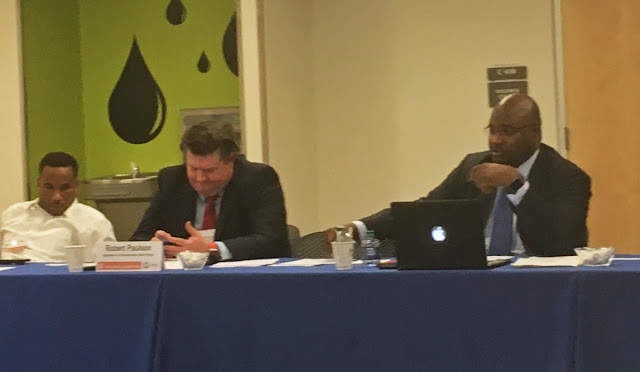With Challenges Come Opportunities to Advance Civic Learning
by Shawn Healy, PhD, Democracy Program Director
Earlier this week, I had the honor of attending and presenting at the Civics Education Leadership Team Meeting convened by the Council on State Governments (CSG) in Lexington, KY. In partnership with the National Center for Learning and Civics Engagement, CSG brought together representatives of all three branches of government from states throughout the country, including Illinois Representative Elgie Sims (D-Chicago); state civic education advocacy leaders; and experts on youth civic development (see the agenda and list of attendees).
 |
| Rep. Elgie Sims speaks at the Civics Education Leadership Team Meeting |
A panel presentation by Center for Information Research on Civic Learning and Engagement (CIRCLE) Director of Impact Abby Kiesa struck a chord with me and is the basis of today’s post.
Abby identified four challenges and parallel opportunities in the civic education space.
- Last week, CIRCLE released a new national index of county-level youth civic engagement opportunities. It is searchable by state and provides information on local educational attainment, the frequency of competitive elections, potential youth influence on elections, overall quality of life measures, and finally, a rating of community civic culture. Even among Illinois’ 102 counties there is significant variation and this speaks to Abby’s first identified challenge. In turn, through state policy we can achieve scale and help reduce the “civic empowerment gap” evident in these ratings.
- Civic education is broadly defined and there is not a one-size-fits-all model for youth civic development. In this fog lies opportunity as we can tie civic learning outcomes with college and career readiness metrics. Moreover, important civic skills like news literacy fall under this umbrella. And finally, civics can latch on to the microcredentialing movement to recognize students’ acquisition of the knowledge and skills necessary for informed, effective engagement in our democracy.
- The field of civic education has a tendency to focus obsessively with the knowledge side of the equation, neglecting civic skills, attitudes, and behaviors. Thankfully, we have an extensive body of research that paints a broader picture of civic competencies. Additionally, because civics is infrequently tested at the state level, our field has an opportunity to design and implement more authentic forms of assessment that allow students to demonstrate the whole of their civic personas.
- Finally, policy implementation is an underappreciated and poorly funded endeavor. Yet I can speak to our own experiences in Illinois in outlining the art of the possible, and future frontiers include more comprehensive exposure among pre-service teachers to civic content and best practices in civic education, along with the prospect of microcredentialing in-service teachers as they achieve mastery in facilitating controversial issues discussions or students’ service-learning projects.




Comments
Post a Comment